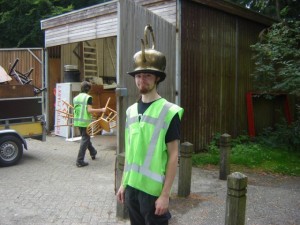Some weeks ago I had a conversation with a friend about the making of tools and workbenches. When he said: “But…not all guys are as resourceful as you.”
I thought a lot about these words, and can’t conclude otherwise than that he is right. But in a way it is hard for me to understand why people aren’t resourceful, as it comes very natural to me. And what does it mean to be resourceful?
To me being resourceful means to care about and respect your resources. To put them to good use, with as less waste as possible. To repurpose leftovers and save them from the scrapyard or landfill. It means to mend – or use materials from – things that are broken or discarded and give them a new, useful life.
Flea market and consumerism
To me it’s a mode of living that started in highschool. My father and I volunteered at a local fleamarket. We got the things people were throwing out, not because they were broken. But often because they replaced them with a newer version of the same thing.
 When flatscreen monitors and tv’s became the newest fashion everybody threw out their bulky models. It happened that we got expensive wide-screen tv’s and monitors that were never used, new in the box and everything. “Yes it’s new, but I bought a flatscreen instead” almost became a running gag. We often wondered where people got the money to do so.
When flatscreen monitors and tv’s became the newest fashion everybody threw out their bulky models. It happened that we got expensive wide-screen tv’s and monitors that were never used, new in the box and everything. “Yes it’s new, but I bought a flatscreen instead” almost became a running gag. We often wondered where people got the money to do so.
And on the other hand we were flabbergasted about the difference in quality between the older and newer generations of consumer goods. A stereo from the seventies is often built to last at least a couple of decades. Metal frames, housings and knobs, good quality potmeters etc. Same thing with good quality tools and goods from the fifties. Tube amplified radio’s often still work just as good as they did then. And when they do break down, they can be serviced. But try something like that with a stereo or radio from the nineties or zeros.
The same thing with computers and printers. Compare the built quality of an eighties IBM desktop to a Dell that comes right from the factory. The latter is built to break down in a couple of years, while the old one will often still work (and when you run programs from the same period they will do the same things they were built for 30 years ago). One thing that shows this even better are printers. Once expensive precision machines (try those old first generation HP printers), now something cheap that’s used as a means sell you expensive ink.
 This phenomenon is symbiotic to our culture of consumerism. A manufacturer can easily make products that last years. But when they do the consumer will not have to buy their products in the future. The consumer on the other hand wants cheaper goods and replace them after a couple of years with something new. Because something new is always better, right?
This phenomenon is symbiotic to our culture of consumerism. A manufacturer can easily make products that last years. But when they do the consumer will not have to buy their products in the future. The consumer on the other hand wants cheaper goods and replace them after a couple of years with something new. Because something new is always better, right?
This whole system makes that we don’t care for our goods as we used to. Because when something cheap breaks down we can always replace it with something else that’s cheap anyway. And it’s fueled by another mode of sports: marketing, which can best be described as exploiting desire by anticipating on our most primal instincts.  Another invention tied in with that is fashion. Social expectations demand that you will wear the latest fashion and have the latest model telephone. I often get the question why I don’t have a smartphone, but still use that oldfashioned Nokia. The answer is simple: because I don’t need one. I simply don’t call enough to justify the expenses of a smartphone.
Another invention tied in with that is fashion. Social expectations demand that you will wear the latest fashion and have the latest model telephone. I often get the question why I don’t have a smartphone, but still use that oldfashioned Nokia. The answer is simple: because I don’t need one. I simply don’t call enough to justify the expenses of a smartphone.
At the flea market we tried to find a new home for used goods. Sometimes we had to do small repairs, adjusting bicycles, formatting harddisks and putting a new operating system on computers, gluing broken legs of chairs, rewiring an old lamp. Some things that weren’t used here anymore were shipped to other parts of the world, like typewriters to Togo and fur coats to the former Soviet Union.
Sometimes things were too worn down to be used again, but then we often gutted them for parts. Two broken computers became one working model, three incomplete Singer sewing machines became two that were better than new. Now, years later, we often hear people still use the machines and goods we fixed.
The philosophy of the fleamarket
As the fleamarket stopped its philosophy lived on. The first thing I think when I see something I like is not “How can I buy that” but “Can I make that myself?”. And I know this isn’t always the most fast or economical way. And some things are impossible to make yourself. But it sure is fun and good to try. It gives me deeper knowledge of and understanding of the object at hand. And it puts using the thing in a whole different perspective.  You are simply more careful with something you made yourself. And with something that you can’t make yourself it deepens the respect for the people who developed and made it, and makes you literally more care-ful towards the object at hand.
You are simply more careful with something you made yourself. And with something that you can’t make yourself it deepens the respect for the people who developed and made it, and makes you literally more care-ful towards the object at hand.
When something breaks or wears out I try to fix it. When it isn’t serviceable anymore it gets taken apart and the useable materials are taken out.  I’ve skinned couches to use the leather, cut up solid oak furniture to make tools and art pieces. An old workbench became toolboards. The old trailer we used at the flea market lives on as a workbench.
I’ve skinned couches to use the leather, cut up solid oak furniture to make tools and art pieces. An old workbench became toolboards. The old trailer we used at the flea market lives on as a workbench.
I try this even in instruments, by using local grown woods or repurposing old hardwoods, rather than buying new and adding to deforestation. A very interesting project in this is the Leonardo Guitar Research project
Sandra and I live in a small (40m²) house. People often look strange upon this, but love it. Even though it’s packed to the brim with books (over 50 running metres of bookshelves and many stacks) and the materials we use for our hobbies (fabrics, paper, wood, paint, guitars, an outdoor-kitchen and brewery). Living in a small house makes you more creative with the space you do have. So we made the whole thing multifunctional. Living in a small house is cheaper, both in rent as in living costs. But even better, it is more kind to the environement. It takes less fuel to heat up a small house than a large house. For two people it can be large enough. Yes, a larger house with spaces for a library and spacious ateliers would be wonderful. But we don’t need it. We are happy with our tiny home.
If there is one thing I have learned over the last couple of years is that it is far more important to be happy than to make a lot of money.Increasing your happiness is far easier to achieve by lowering your desires than by increasing your wealth.  Maybe for some this may sound somewhat esoteric, but it is far from that. It rather is a choice to keep my feet firmly on the ground and not to take part in the social rat-race of our modern western society. A bottomless pit that can never be (ful)filled.
Maybe for some this may sound somewhat esoteric, but it is far from that. It rather is a choice to keep my feet firmly on the ground and not to take part in the social rat-race of our modern western society. A bottomless pit that can never be (ful)filled.
In a way this idea of being resourceful is somewhat countercultural. It goes against the grain of our society and it’s more-more-more-consumer-culture. It’s quite close to what Christopher Schwarz describes as ‘anarchy‘ in his wonderful “Anarchist Tool Chest”. Or the ‘Quality’ Robert M.Pirsig contemplates in his classic “Zen and the Art of Motorcycle Maintenance”.
I know this isn’t the easy road to follow, but it has been right for me. I have tried to do it the other way, to go with the grain. Worked a well-paying, but soul-crushing 9-5 job. But conflicted with everything I stand for and landed me with a massive burn-out and depression.
Please don’t get me wrong, I’m not opposed to a free market economy. I’m not a marxist or communist, those systems have proved themselves to be useless. But I do ask myself the question what we really need to be happy. And something I observed in our society is that we have gone too far in our greed, we have exhausted our environement and the resources (both natural and human) on this earth. The problems we face in our society are an indirect consequence of our hunger for oil and minerals. I therefore hope you will read this blog as a plea for solidarity and humanity.




Here here!
Pirsig wrote about Quality with an upper case Q, something most people recognise, but do not care enough to achieve. You clearly do care. And that is the best answer for your friend: “Not all guys (or gals) care enough to be resourceful.”
~Allen
LikeLiked by 1 person
Well said and I couldn’t agree more with your comments. I wish that more people in the world thought as you do – greed has become an insidious and pervasive disease in our time. Life need not be complicated.
LikeLike
I could not agree more with you. Still, breaking completely free from consumerism is no easy task, so I am slowly changing to your way of living, eventually I will reach a balance where I can take the best of both sides. I do keep far too many scraps of wood though, but you never know when you could use them for inlay/repair work. awesome, I love your blog!
LikeLike
This too is how I strive to live! And for my efforts I get called cheap and become more and more outcast. I suppose I don’t need that kind of negativity in my life anyway. The part I find hilarious is that when shit goes wrong/breaks guess who they come running to….
LikeLike
Truth.
LikeLike
Thanks for putting this up! This resonates with me – and my quest for inner richness – so much! Please take a look at my starting-to-break-free business: http://www.peterpeer.nl
Kind regards, Peter de Klein, Grave, The Netherlands.
LikeLike